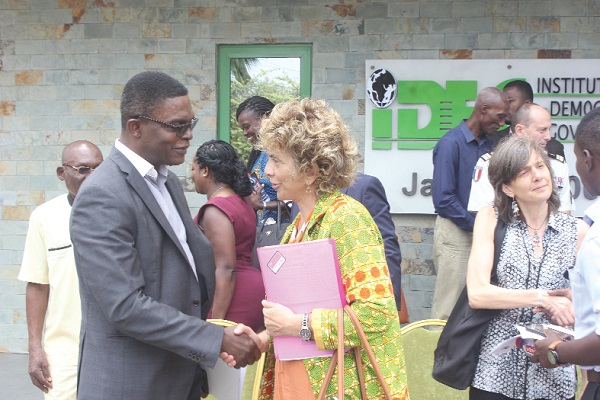
Commitment required to resolve political conflicts — Colombian Ambassador
The Colombia Ambassador, Ms Claudia Turbay Quintero, has called on the leaders of political parties and the government to be committed to the use of dialogue to resolve political conflicts in the country.
She observed that in doing so, the aggrieved parties ought to consider the larger interest of the society since citizens had the right to peace under the Constitution.
Advertisement
Ms Quintero also stressed that parties in political conflicts needed to go to the negotiation table with truth, bearing in mind that they had a duty to protect the peace of the country.
"When problems come, we need to know that they can be resolved through dialogue and negotiations, and agreements that are arrived at must be in the larger interest of the society," she stressed.
Forum
She was speaking at a public forum organised by the Institute for Democratic Governance (IDEG) to discuss the useful lessons Ghana could draw from Colombia's road map to help bring an end to a 52-year armed conflict within four years.
The forum was on the theme: "Ending armed conflict through sustained dialogue in Colombia: lessons for Ghana."
Participants in the event were drawn from the academia, state institutions and civil society organisations (CSOs).
Commitment
The Executive Director of IDEG, Dr Emmanuel Akwetey, who also addressed participants in the event, said it was important for the political parties in the country to take steps to stop their members from using small arms during political campaigns and other related activities.
The Colombian situation
On September 26, 2016, the Colombian government and the left wing rebels signed a historic agreement that formally ended a 52-year armed conflict.
The peace process lasted four years from August, 2012 to September, 2016.
Other Trending Stories
An International Relations expert at the Faculty of Political Science, Government and International Relations at the Universidad del Rosaria, Colombia, Professor Arlene B. Tickner noted that in all conflict situations, it was key to address the root cause of the problem.
Prof. Tickner also said it was important for parties in conflicts to adhere to agreed road map and timelines.
Ghanaian situation
Ghana has witnessed conflicts and vigilantism in the political space for many decades now.
Many of the political conflicts have led to loss of lives, maiming of people and disruption of peace and order.
The most recent of these conflicts was the violence at the Ayawaso-West-Wuogon Constituency by-election in Accra when some people sustained gunshot wounds from groups believed to be linked to political parties.
In the aftermath of that gory situation, the President, Nana Addo Dankwa Akufo-Addo, called for dialogue between the two major political parties involved in the conflict — the New Patriotic Party (NPP) and the National Democratic Congress (NDC), to bring a lasting solution to the menace.
He followed it with an order for a bill on political vigilantism and related offences to be drafted and passed by Parliament.



